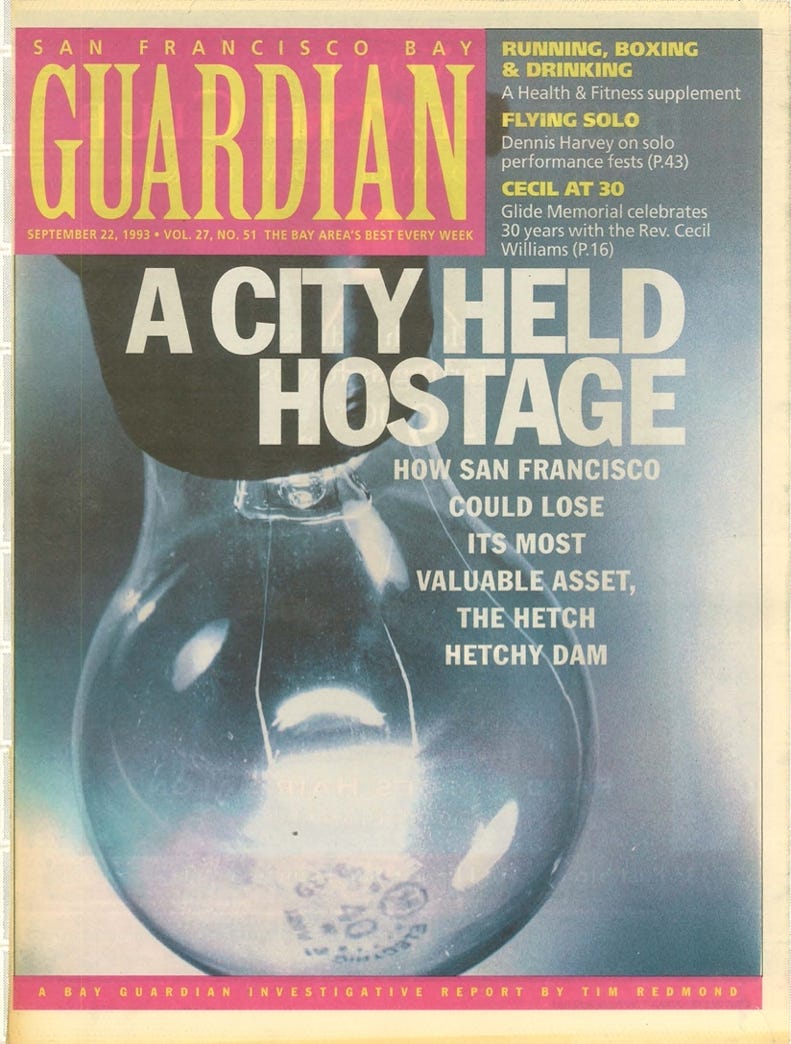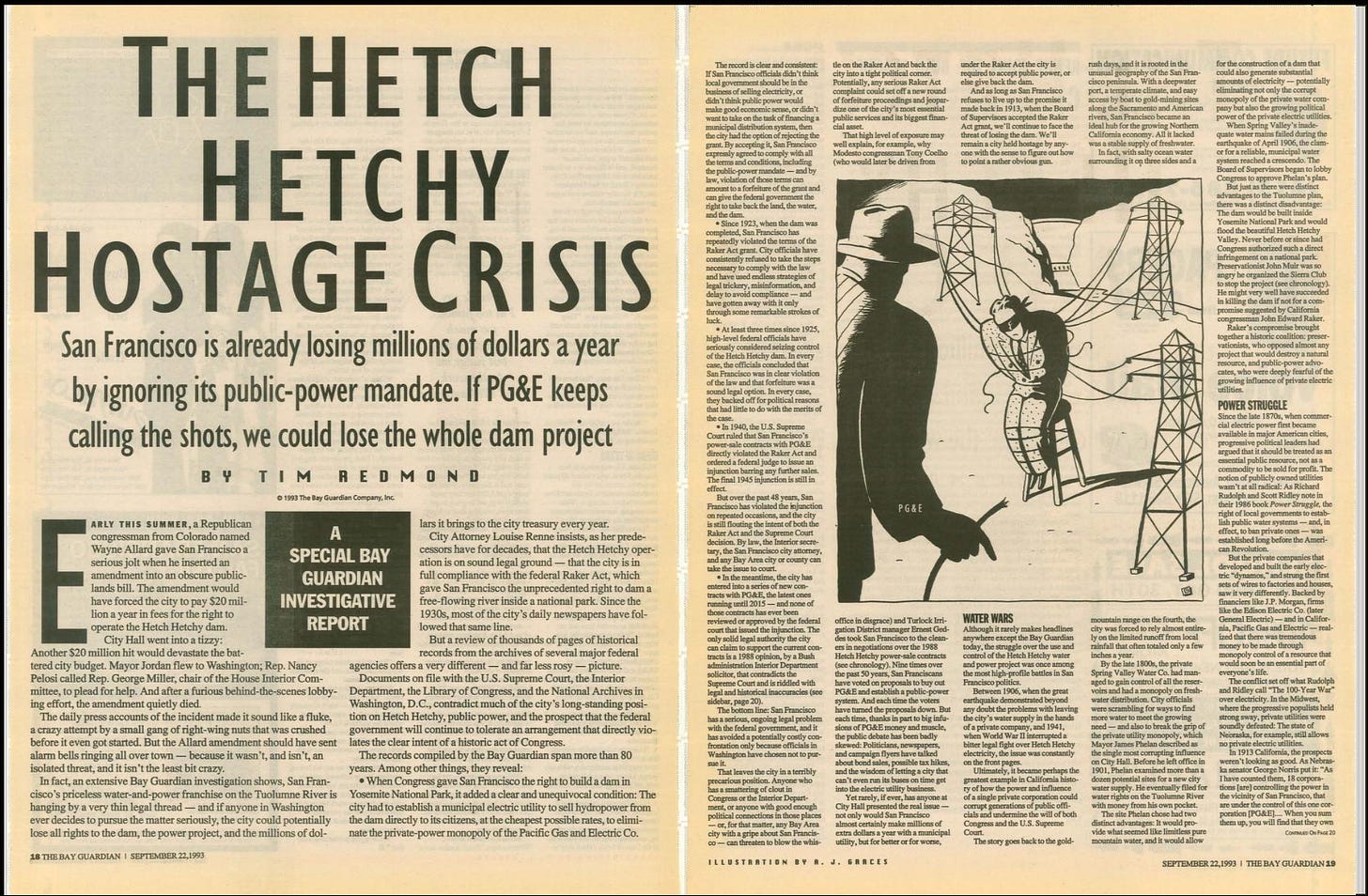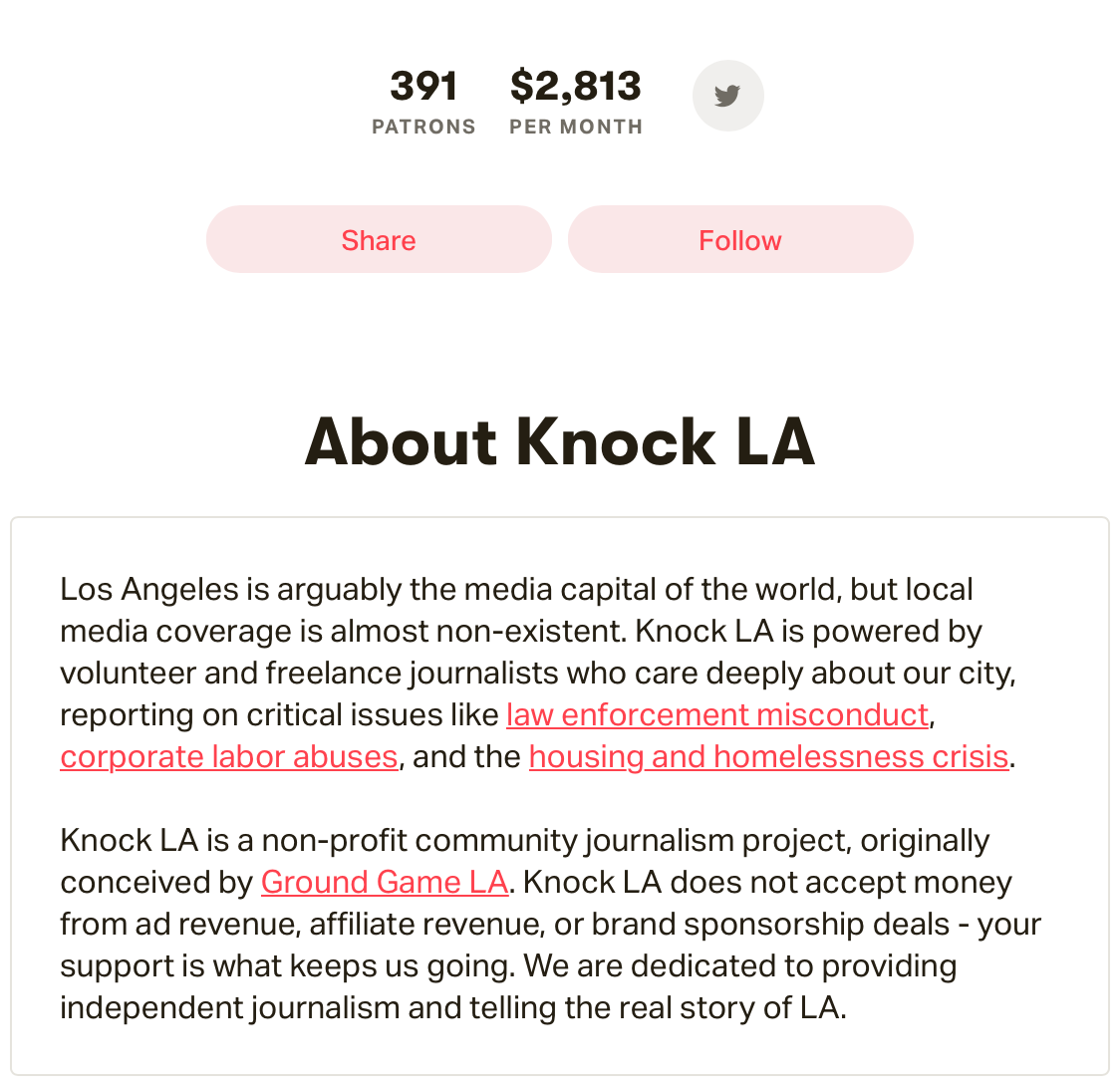Blast from the past: PG&E continues to privatize San Francisco's electricity
...and some thoughts on our subs-driven news media
I was doing some more background research for our water/pistachio oligarch documentary, when I came across a great old feature from 1993 in the San Francisco Bay Guardian — the dead alt-weekly. The story is about the forgotten history of how PG&E was able derail the creation of a publicly owned electrical utility in San Francisco a century ago, and then use its private profits and power to maintain monopolistic control of the city’s energy supply to this day. PG&E did all this even though the energy that it was using belonged to the city and was generated using city owned hydroelectric power plants. And it did it, despite a federal law that allowed San Francisco to grab land in protected national park and then destroy it by building a dam and flooding it specifically mandated that the electricity generated by the project would be publicly owned and operated. But that’s not how it came to be.
This whole story is tied up with San Francisco’s imperial water grab out in the the Hetch Hetchy Valley of Yosemite National Park that took place a hundred years ago. But the politics of it are still very much in play: PG&E grabbed that electricity and it is still holding it hostage today — and it has done so with the complicity of multiple generations of San Francisco politicians. Only in the last few years — after PG&E’s recent, disastrous track record of wild fires and random gas explosions — have pols here started to talk about doing something to wrest control of the city’s electricity from PG&E. That’s a century after the fact. Although the original story of how it got started is all but forgotten.
The Bay Guardian is long dead but you whole paper issue is up on archive.org.
Source
Googling around, I found out that Tim Redmond, the journalist who wrote the story back then, recently updated this ongoing saga. Turns out there was an anthrax connection — an anthrax scare that was used to possibly to derail a vote on the issue under mayor Willie Brown. I had no idea! Gotta love San Francisco politics. Emphasis mine:
Over and over since the 1920s, activists have tried to pass ballot measures to take over PG&E’s system; over and over, PG&E spent all the money it needed to defeat them.
For much of the 20th Century, the local news media either ignored the issue or sided with PG&E. When the Bay Guardian broke the story of the Raker Act Scandal in 1969, after a UC Berkeley biochemistry professor named Joe Neilands walked into the young paper’s tiny office to offer Publisher Bruce Brugmann information that nobody else would publish, the general response from the local dailies was—at best—dismissive.
For decades, as I took this story over, the Chron and the Examiner would either ignore everything I wrote or make fun of it. So would most of the elected officials in the city.
Here’s how bad it got: In November, 2001, a ballot measure by then-Sup. Tom Ammiano that would have created a municipal power agency appeared to be passing on Election Night.
Then all of a sudden Mayor Willie Brown’s election director announced that she was afraid there might be anthrax in the ballot boxes. So she stopped the count and moved the boxes out of City Hall to an unsecure storage location.
No anthrax was ever found. When the final tally came in some days later, public power had lost by 533 votes.
The Coast Guard and numerous residents later found parts of ballot boxes floating in the Bay.
There was no official investigation. The mayor, the district attorney, the city attorney, the daily newspapers—everyone acted as if nothing unusual had happened.
So what changed? How has the city reached a point where even the established organizations and leaders (London Breed is the first mayor since Art Agnos to come out in support of public power) are lined up against PG&E?
District Elections in 2000 shifted the balance of power profoundly. PG&E could no longer guarantee the election of a friendly board with the money that it took to run citywide campaigns.
Then there was San Bruno. And bankruptcy. And the fires, which were caused in part by PG&E shifting money from fire-prevention to executive salaries and profits.
Still: PG&E apparently decided that it had beaten off public power so many times that it could continue to control SF politics. The company has, over the past few years, tried to impose ridiculous fees any time a city agency, or city project (including affordable-housing projects) tried to hook up to the PG&E grid…
Flipping through this old Bay Guardian feature reminded me of something I’ve been complaining about for the last year or so: the depressing state of our new subscriber-driven news media economy.
Driven by direct payments from readers, the hope was this was going to create a whole new type of independent news media landscape. Journalists would be free to do their work without interference from editors or pressure from media owners, publishers, and advertisers. It was gonna be the dawn of a new media age. Finally, the democratic promise of internet was going to be realized! No slaves, no masters!
And it’s true everyone has a Substack now and everyone is pumping out stuff on their Rokfins and Rumbles and Callin apps with an insane ferocity. The amount of content is truly staggering. It’s pathological at this point. It’s like the more you post, the more you have to post. How many words and videos and interviews can you possibly do a day? No limits baby!
But in terms of journalism — I’ve never seen a more degraded and empty landscape. There is almost no journalism done on these direct-to-the-people platforms. It’s all media criticism, media fights, media scandals, and people posting their fucking opinions all day and all night.
I’ve been watching it develop and much of it truly has become a parallel version of the cable news circuit — driven by the same sort of economic incentives: bullshit moralistic controversy and brand-building and media cult grooming. And for the trick to really work, it requires a partisan readership kept polarized and in constant tension and anger. Work and reporting that takes weeks and months to bear fruit? It just doesn’t bring in the numbers. This new environment is built around feverish posting and the whipping up of predictable and superficial outrages. You gotta stay in the news cycle and hit the same point over and over and over again. You gotta substack to the choir, as the saying goes.
These subs platforms were supposed to help people break away from naked and cynical market forces. Instead, they slotted us right into this same debased media market — in purer and rawer way.
Anyway, now I’ve gone way off topic...Maybe I’ll explore this subject another day and add my own media crit to the ever-growing media crit trash pile that our news media produces.
—Yasha Levine
Want to know more? Read: “A perfect end to 2020 for the left.”
PS: As an example of this new marketplace at work, look at the tiny amount of support that Knock LA, a lefty community journalism outfit in Los Angeles, gets on Patreon. They’re the ones who published a groundbreaking multipart series looking at the gangs that operate within the Los Angeles County Sheriff’s Department.






Hey man, sorry not trying to be a pest and I could've missed something, but when do you think the pistachio (film still I hope?) thing coming out? I've been eagerly awaiting it ever since you first talked about it. I guess I should probably explain exactly why. I'm really into western American history and find the state of California's particularly entrancing and maddening. Much of that state's land was stolen by legal, extra-legal and deadly measures and the thieves still hold the majority of it, if not even more now. Also what happens in the central valley(s) of the state don't get talked about much in the news as all we're ever told about are the coastal cities and LA. I've also been into neo-noir (and the particular sub-genre Cali-noir going back to "Chinatown" for me) for a long time and my interest was rekindled or reawakened when HBO dropped the "Perry Mason" series a few years ago set in the post-WWI, pre-WWII period on Southern California. Really looking forward to the fruition of your project.
Re: PG&E, you may already know this, but the vast bulk of non-Californians who follow the MSM (and especially RWM) appear to think that it's state-owned and yet another example of the commies in Cali ruining things and burning the state down (literally). That it's just another rapacious for-profit corporation isn't part of their narrative. Hmm...wonder why.